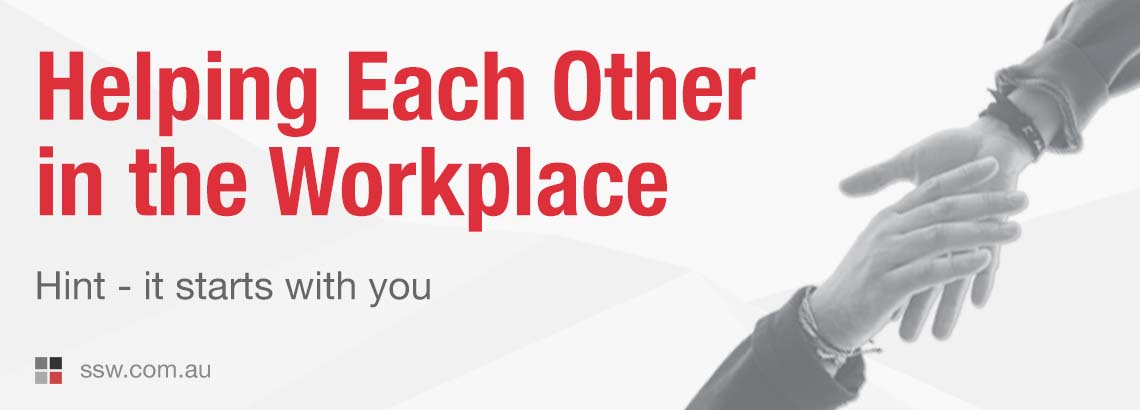Helping each other in the workplace – Hint: It starts with you
Last month I spoke to you all about Speaking up about Workplace Unfairness… It’s a super important topic for employee wellbeing, and I thought a good follow-up would be to share some tips.
We’ve all experienced unfairness, whether it be in the workplace, or in our personal lives. Let’s first look at the impact of unfairness, and then look at how to help navigate it.
Unfairness and how to deal with it
Everyone wants a place where people help each other. Unfairness can really impact people in the workplace. It all starts with how you approach things; some people are better than others at dealing with unfair situations.
Let’s assume one of these common scenarios:
- New great project – someone is assigned to it… someone is unhappy
- New promotion – someone gets it, someone else is unhappy
These might seem like unfair situations. People don’t want to be unfair… friends don’t… bosses don’t, so how do we manage it?
10 tips to manage unfairness
Here’s 10 tips I’ve given my team at SSW to help manage unfairness.
- Gotta speak up – See: Do you know to speak up?
- Happiness is relative – Unhappiness can come from comparisons with others. Instead compare yourself with yourself, and aim to improve each day.
- Get one thing in life, lose another – Can’t have everything. When you are saying ‘Yes’ to one thing, you are saying ‘No’ to another.
- The ‘Happiness Equation’ – Happiness = Expectations – Reality
If you want to be happier, then:
– Reduce your expectations
– Increase your reality - Consider luck – Everyone wants to succeed in life. But what causes some of us to be more successful than others? Is it really down to skill and strategy – or something altogether more unpredictable? Sometimes peoples success is simply luck. Read the book “Fooled by Randomness“
- Compete with yourself by embracing Scrum – Competing with yourself is the best approach. The same with teams. In software, Scrum is the best way of working as you only compare yourself… or your team with what you did before. Using empirical data is the way to go.
- Understand intentions – Try to see yourself in others shoes. Understand that people don’t want to be unfair. It is common to be assuming the wrong stuff. Ask questions, and you will understand even better the logic your friend or boss is using.
- Be the ‘squeaky wheel’ – “A squeaky wheel gets the most oil.”
Bonus – there is is bonus to asking questions, the person now knows that this is a topic you have interest in… so when this issues arises in the future, it is more likely that they will reach out to you and therefore you’ll continue to get more information. It’s like you’ve “subscribed” to the topic. - Have attainable ambition – Having goals and being ambitious is great, but you’ve got to be careful. You need your expectations to be realistic enough to push you… but not so much that it makes you unhappy.
Overly ambitious people are often unhappy, because they never get there! Sometimes people find they are never rich or never successful enough… - Celebrate other people’s wins – This is my favourite. If you can be at peace, and in a place where you can celebrate others’ wins, you will be pushing each other up, rather than climbing over each other. I believe everybody gets their days of sunshine, so when others achieve something, be happy for them, send a nice message, ‘like’ their posts, etc.
“Always clap for your friends, even if their dreams come true before yours.” – Eleni Sophia
Hopefully these tips will help you have a culture of helping yourself and helping others.
SSW’s Favourite Tip
I asked my team which one of these tips did they like best. Overwhelmingly it was tip #1 on speaking up. Communication is so important to all of us. At SSW I’d say it’s almost more important than how well you code, so that wasn’t a surprise for me.

The least favourite was luck – I think it’s because people don’t like hearing it, as it is something they can’t do anything about!

I like to learn too – how do you deal with unfairness, or have you got a favourite tip? Let me know in the comments!

March 7, 2022 @ 11:49 AM
I’ve not tried #6 Scrum just with myself but that would be super helpful to quiet nagging insecurities.
March 9, 2022 @ 2:34 AM
Nice article. Thanks.
It really makes you think. For me, given how tricky the last few years have been – I’d go with No 9.
Goals that are attainable. Then recognise you have achieved them and praise and acknowledge that moment. If you are always striving for more; you risk never appreciating what you have. Emma
March 10, 2022 @ 10:02 PM
This is an important message on recognising and speaking up about unfairness.
On the other hand, it’s also vital to make note of your own short comings and how you can improve yourself (aka a growth mindset).